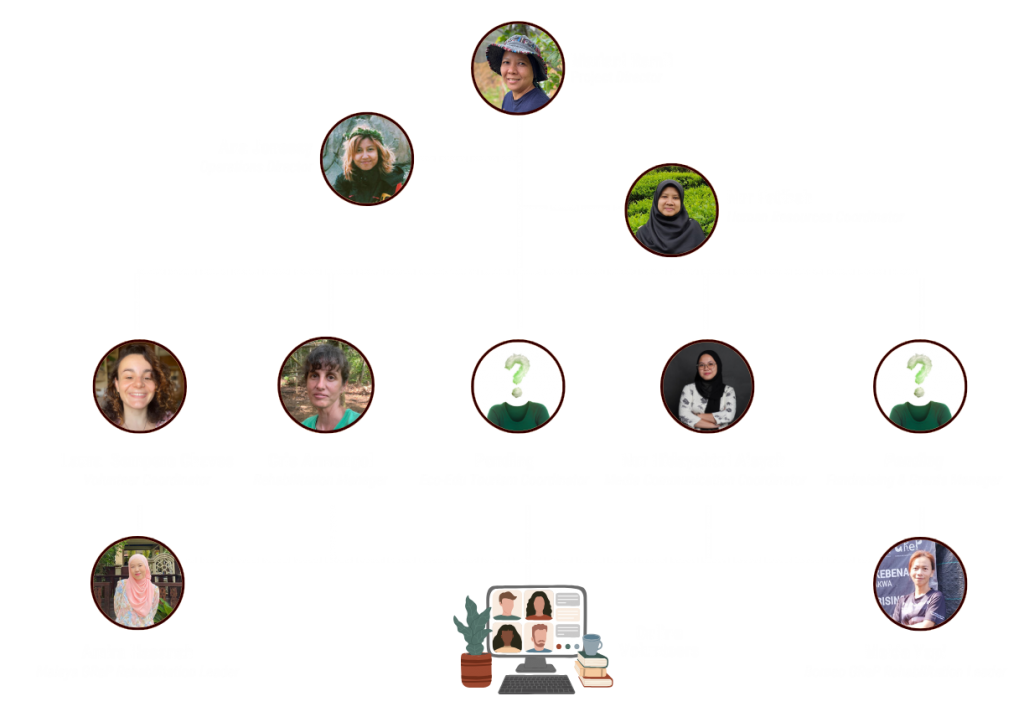Gibbon Conservation Society

Gibbon Conservation Society or GCS, is a Malaysian NGO that was founded (unofficially) in 2013. We believe it is important to approach conservation from every possible angle in order to truly solve the issues faced by our wildlife. That is why we work towards a comprehensive approach that not only tackles rehabilitation and the wildlife trade, but also empowers individuals, collaborates with communities, contributes to scientific research, spreads awareness across the globe and so much more.
Our society is constantly growing and being ‘re-innovated’. In 2013, when founder Mariani Ramli a.k.a Bam was tasked to care for an infant gibbon, a species she knew nothing about, she researched and learned everything she could. She studied international guidelines and consulted with experts form all over the world. She held firm the belief that we must always keep learning, improving and finding new solutions. That mindset is how GCS has established the only internationally accredited rehabilitation centre for gibbons in Malaysia and how it continues to grow and has become a reference for similar projects in other countries.
Bam never planned or expected things to turn out the way they have. She only wanted to help that first infant gibbon and did everything she could to achieve that goal. Today, our society’s motivations remain the same, we only want to do the very best we possibly can to help these endangered animals and so we continuously innovate and find new solutions everyday to make that a reality.
How it all started
In early 2013, Mariani Ramli, better known as Bam, found herself caring for a 5 month old Agile Gibbon named Ellek. Ellek had just been rescued by the wildlife department from his ‘owner’ on the east coast of Malaysia, after being kept as a pet for several months.
Falling in love with him instantly, Bam, an employee of the national wildlife department at the time, volunteered to care for Ellek. With no prior experience, training or knowledge, Bam treated him like a human child, even dressing him in clothes occasionally.
Over time Bam begin to realise that treating him like a human or a pet wasn’t good for him. He seemed depressed in her small Kuala Lumpur apartment. Determined to make him happy, she enrolled herself in university to study animal biology and read everything she could about his species. She even travelled around Asia to several gibbon rehabilitation centres to learn how to care for him.
Yet despite her best efforts, Ellek would never be returned to the wild. After only a year with Bam, Ellek died of a bacterial infection he caught from having contact with the ground.

Devastated, Bam refused to have anything to do with gibbons anymore. But a phone call from a colleague in August 2014 changed that.
Bam accompanied her colleague to rescue another male gibbon, this time a Lar Gibbon from central Peninsular, with the intention of only advising. But the moment her eyes met his, her decision was made. She named him Daru and the rest, as they say, is history…
Through her studies, Bam discovered that Ellek’s death was not an uncommon end for primates who are kept as pets. Across Malaysia and in many parts of the world, gibbons and other wildlife were dying in the hands of humans. Improper care and inappropriate diets were killing them. They just did not belong in the urban world with us.
Faced with this knowledge and the haunting memory of Ellek, Bam knew she could not sit by and let this happen any longer. She created the Malaya Gibbon Rehabilitation Project (Malaya GReP) and the Gibbon Conservation Society, to protect, conserve and rehabilitate these animals.
Today, Bam and her team run 2 rehabilitation centres in Malaysia.
Read more:

Read more about the work we do in our society overview. Last updated 18.03.2023, for more current information, please refer to our website.

Read our Annual Activities Reports
Official Patron

Yang Amat Mulia
Tengku Arif Bendahara
Tengku Muhammad Iskandar
Ri’ayatuddin Shah ibni Al-Sultan Abdullah
Ri'ayatuddin Al-Mustafa Billah Shah
GCS Society Management Chart

On Ground Organization Chart

Board of Advisors
As part of our commitment to continue improving, we consult a board of trusted advisors from time to time on things like gibbon rehabilitation, law, research, veterinary medicine and more.

